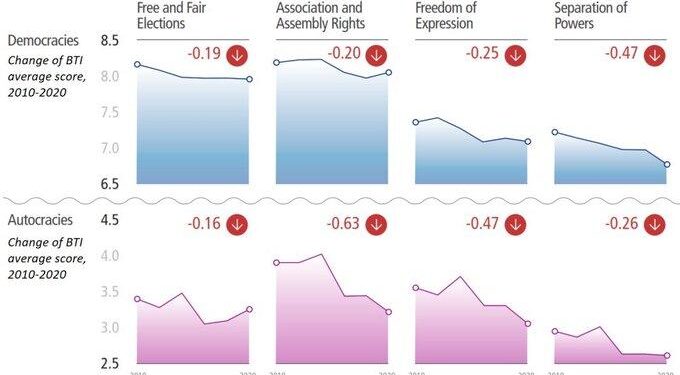Georgia, once widely seen as a vibrant democracy at the crossroads of Europe and Asia, is facing a rapid and alarming erosion of its democratic institutions. As the government shifts its foreign policy orientation closer to Russia, concerns are mounting over increasing authoritarian tendencies, shrinking civic freedoms, and weakening checks and balances. This article examines the key developments signaling Georgia’s democratic backslide and explores the implications of its pivot towards Moscow amid ongoing regional geopolitical tensions.
Georgia’s democratic institutions under pressure as Kremlin influence grows
In recent months, Georgia’s political landscape has undergone a marked shift, raising concerns over the resilience of its democratic framework. Increasingly, governmental decisions appear to align more closely with Moscow’s strategic interests, signaling a departure from Georgia’s previous pro-Western orientation. This pivot has manifested not only in foreign policy but also in the suppression of independent media and civil society voices, undermining transparency and accountability. Reports highlight growing pressure on opposition parties, with allegations of judicial interference aimed at weakening political pluralism.
Key indicators illustrate the erosion at multiple levels:
- Legislative Changes: Recent amendments curtail checks on executive power.
- Media Landscape: Independent outlets face intense censorship and financial strain.
- Civil Society: NGOs report increased surveillance and bureaucratic hurdles.
- Judiciary Independence: Courts are perceived as aligning with government interests.
| Democratic Indicator | Current Status | Trend |
|---|---|---|
| Media Freedom | Restricted | Declining |
| Judicial Independence | Compromised | Worsening |
| Political Pluralism | Limited | Shrinking |
| Civil Society Activity | Constrained | Decreasing |
Decline in media freedom and civil liberties signals backsliding democracy
Recent developments in Georgia reveal a troubling pattern of shrinking democratic space, marked by increased government control over independent media and restrictions on civil society. Journalists critical of the ruling party face intimidation, legal harassment, and in some cases, outright censorship, which undermines press freedom and violates the public’s right to information. Civic activists and opposition voices report similar repression, with crackdowns on peaceful protests and limits imposed on NGOs, signaling a clear erosion of fundamental civil liberties.
Key indicators reflect this downward trend:
- Media independence: Over 60% of independent outlets report increased pressure since early 2023.
- Freedom of assembly: Restrictions on public gatherings and increased police presence at protests.
- Judicial impartiality: Rising cases of politically motivated prosecutions.
| Year | Press Freedom Index | Civil Liberties Rating |
|---|---|---|
| 2021 | 48/100 | 7/10 |
| 2022 | 56/100 | 6/10 |
| 2023 | 65/100 | 4/10 |
These shifts not only harm democratic institutions but also signal a strategic pivot towards authoritarian governance models, further aligning Georgia’s political trajectory with that of Russia. The cumulative effect erodes public trust and diminishes the country’s prospects for genuine democratic reform and Euro-Atlantic integration.
Urgent reforms and international support needed to safeguard Georgia’s independence
The current trajectory in Georgia demands immediate and comprehensive policy adjustments to preserve the nation’s sovereignty and democratic fabric. The government’s increasing alignment with Moscow has accelerated legislative changes that consistently undermine independent institutions, restrict media freedoms, and weaken the checks and balances vital for a functioning democracy. Without swift reforms, the country risks sliding further into autocratic governance, eroding public trust and international confidence alike.
International actors must bolster their engagement with Georgia by offering targeted support aimed at reinforcing democratic institutions and civil society organizations. This includes:
- Technical assistance for electoral transparency and judicial independence
- Financial aid to protect free press and bolster anti-corruption mechanisms
- Strategic diplomatic pressure to counterbalance foreign influence detrimental to Georgia’s autonomy
| Areas at Risk | Recommended International Measures |
|---|---|
| Judiciary Independence | Monitoring reforms and providing expert advisory |
| Freedom of Media | Funding independent news platforms |
| Civil Society | Capacity building and protection from intimidation |
In Summary
As Georgia grapples with rapid political transformations and an increasingly closer alignment with Russia, concerns over the future of its democratic institutions continue to mount. The swift erosion of democratic norms not only threatens the country’s hard-won freedoms but also raises questions about the broader stability of the South Caucasus region. Moving forward, the international community will be closely watching how these developments unfold, mindful of their implications for democracy and security in this strategically crucial nation.














![Poland and France push ahead with defense pact after Paris talks [VIDEO] – TVP World](https://europ.info/wp-content/uploads/2026/01/3036754-poland-and-france-push-ahead-with-defense-pact-after-paris-talks-video-tvp-world-120x86.jpg)

